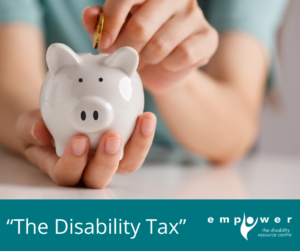“The Disability Tax”
January 27, 2025

In our society, people with disabilities often face something we call the “disability tax.” This means we have to deal with extra costs—whether it’s money, stress, or time—just to go about our daily lives. These extra costs can make a big difference for individuals and families, affecting our finances, social life, and how we get to spend our time.
As everything gets more and more expensive, disabled people are being left out of the conversation, when the financial costs of simply being disabled are higher to begin with.
One example of how the disability tax can affect the finances of a person with disabilities is through extra energy costs. Charging or powering electrical medical appliances and assistive/adaptive technology is one energy drain. But even extra heating or cooling costs – did you know that many medications can be less effective in the heat? – can add up significantly!
Another way the disability tax adds expenses to the lives of disabled people is through out of pocket medical care, supplies, mobility aids, dental and eye care and more. For example, medications for some chronic illnesses can significantly damage your teeth, causing higher lifelong dental costs.
Even for medical necessities that are partially or fully funded, like some mobility aids, the process can be complex and lengthy, leaving the person needing them to either pay out of their own pocket (have you priced a wheelchair lately?) or be physically isolated (and potentially home bound) until the process works its way through the system.
Overall, lack of accessibility in our society often removes the affordable options for people with disabilities. If there are less options for accessible food, clinics, venues, shops or services, disabled people often have no choice but to choose a pricier option, go without or be forced (potentially further) into poverty.